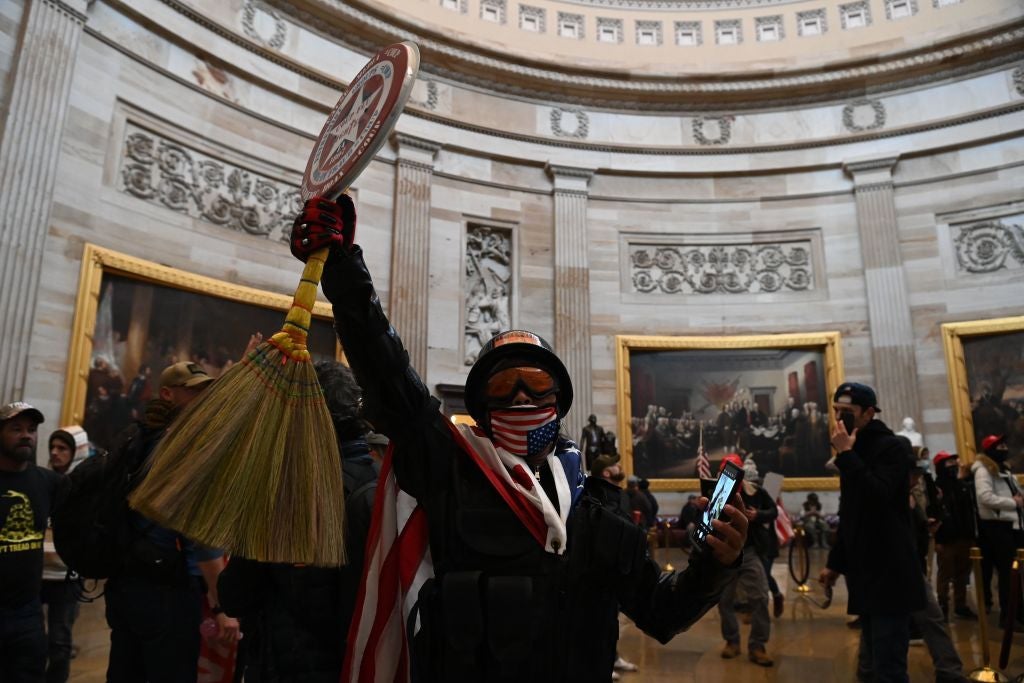At the SelectUSA Investment Summit that took place five months after Donald Trump was inaugurated as president of the world’s largest economy and top investment destination, some 1,200 business executives gathered to hear the new administration’s plans and priorities.
For the most part, they liked what they heard. There was much excitement over the prospect of tax cuts, regulatory reform and what was seen as a pro-growth agenda.
Commerce Secretary Wilbur Ross crowed that his new boss would have “the most rational approach to business” of any US president in modern history and predicted the administration’s policies on everything from energy and the economy to trade and taxes would usher in an almost unprecedented investment boom for the US.
The US’s business leaders should have known better than to gamble the country’s political stability on the promises of a debt-laden reality TV star presiding over rallies that reeked of 1930s Europe.
It was this perceived rationality that corporate America bought into in its wide-scale support of Trump. Never mind that his decades in the public eye had revealed him to be capricious, erratic and temperamental, as well as a ‘businessman’ of spurious repute. Given that business loves stability and loathes knee-jerk policy fluctuations, it was a love affair that was probably always going to end in tears.
The Trump crush that turned into a car crash
However, in those heady days of 2017, the US’s business leaders, still in the first flush of romance, were all too eager to convince themselves and their shareholders that the volatile rages on the campaign trail were the equivalent of ‘locker room talk’ and that underneath the populist veneer there somehow lurked a cool-headed businessman. “I don’t care what he says, I care what he does,” was the common refrain, an easy way to dismiss some of the president’s more outlandish pronouncements.

US Tariffs are shifting - will you react or anticipate?
Don’t let policy changes catch you off guard. Stay proactive with real-time data and expert analysis.
By GlobalDataAt the SelectUSA forum, defences of Trump and his nativist ‘America First’ stance came from such business leaders as Jeffrey Immelt, then CEO of General Electric (GE). When asked whether protectionism might in fact be detrimental to the interests of a highly globalised company with operations all around the world, he bristled at the question and insisted “there is nothing wrong” with the president defending US corporate interests abroad. Support for Trump’s business platform was also expressed by General Motors CEO Mary Barra, among others. The president of the influential National Association of Manufacturers, Jay Timmons, said optimism among manufacturers was off the charts and there was no better time to invest in the US.
Things change. Immelt’s successor, Larry Culp, estimated the trade war with China – one of Trump’s signature policies – would cost GE up to $500m in 2019, while GM grappled with a spike in metal prices and a decline in sales to China thanks to the spat.
Sedition and the final straw
Trade wars and commodity prices are one thing; sedition and violence are another. After riding out four years of a volatile administration in which policy U-turns were announced by tweet, Big Business finally had enough of Trumpism after the events of 6 January. That was the day a mob of Trump supporters laid siege to the US Capitol in an effort to stop the counting of Electoral College votes from the presidential election in November – having been radicalised by false claims from Trump and many of his Congressional allies that the election had been “stolen” and egged on by the president in an inflammatory speech that kicked off the violent protest.
Timmons put out a statement declaring Trump a danger to the country and imploring US Vice-President Mike Pence to invoke the 25th Amendment to remove the president from office. A flood of announcements followed from large corporations saying they would no longer make donations to Republican officials who had supported Trump’s efforts to overturn the election.
Turning off the tap of corporate money flowing into campaign coffers is guaranteed to get the attention of Republican leaders and may well succeed in getting many of them to disavow Trump when all else failed. It may be too late, however, to undo the damage to the US’s institutions and its status in the world – to say nothing of its own citizens’ belief in democracy. There will be no refunds for corporate America’s flirtation with autocracy.
Large corporations and wealthy donors backing unsavoury candidates is nothing new. As GE’s erstwhile leader Immelt might also put it, “there is nothing wrong” either with companies backing candidates they believe will support their interests. However, if these past four years have taught us anything it is that the myth of the pragmatic businessman is just that – a myth, and perhaps a dangerous one. If they themselves were as rational as they are professed to be, then the US’s business leaders should have known better than to gamble the country’s political stability on the promises of a debt-laden reality TV star presiding over rallies that reeked of 1930s Europe. May they show greater caution in the future.
Destabilising democracy is, to put it mildly, not good for business.
Featured photo by Saul Loeb/AFP via Getty Images.




